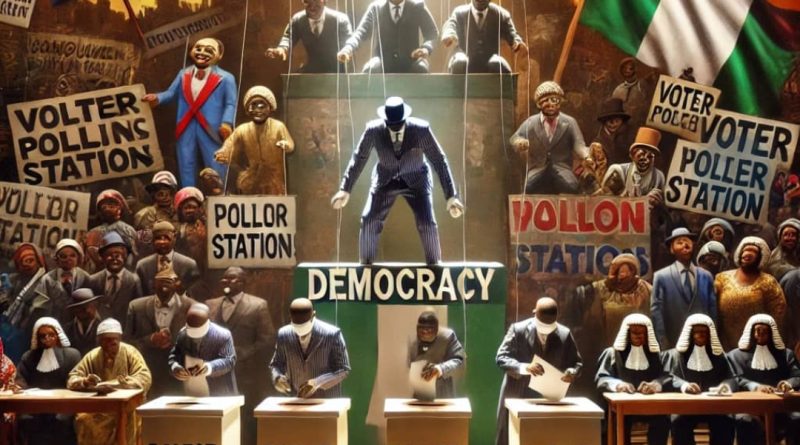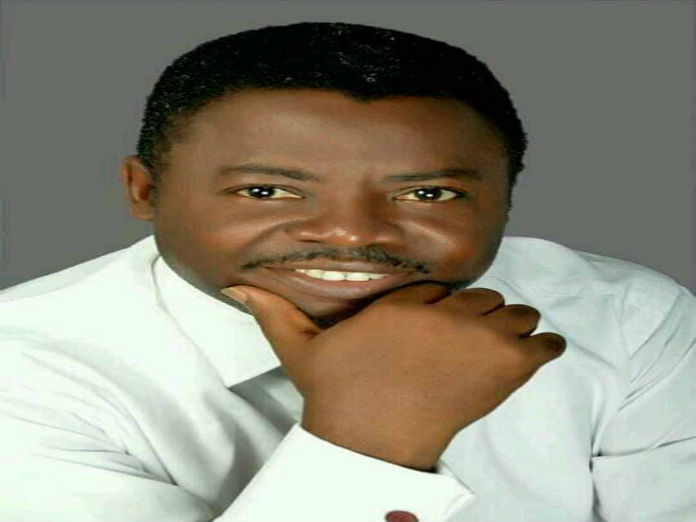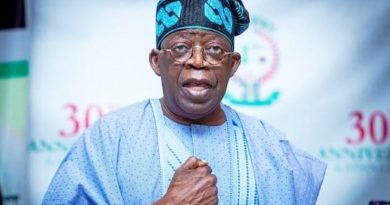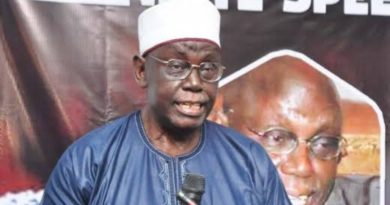THE GREAT NIGERIAN ELECTORAL FARCE: Democracy by Fraud, Hope by Default
Parody with Dr. Iyke Ezeugo
Overture
Step right up to the Great Nigerian Electoral Farce, a riveting Shakespearean drama of deception, intrigue, and democratic dysfunction. Democracy by Fraud, Hope by Default. Join Dr. Iyke Ezeugo on this satirical journey as we lift the veil on Nigeria’s electoral underbelly, where power brokers, desperados, political puppeteers, corrupt electoral and security officials, corrupt judges, and cunning manipulators orchestrate a complex ballet of:
– Voter Suppression: The artful dodgers silencing voters, fueling apathy and impunity.
– Electoral Integrity Crises: Jugglers undermining the electoral process.
– Vote-Buying and Manipulation: Kingpins buying votes, results, and judgments.
Witness the 2022 Electoral Act’s well-intentioned reforms crumble under the weight of entrenched corruption, partisan interests, and systemic flaws. Relive the chaotic 2023 general elections and follow-up state elections where:
– Polling stations vanished.
– Voters were silenced.
– Voting records were altered.
– INEC gave evidence in courts to cover shame and maintain institutional pride.
– Tribunals and Courts gave judgments without justice in the face of obvious fraudulent outcomes.
Get ready to laugh, cry, and rage at the absurdities of Nigeria’s electoral circus. Will hope prevail, or will fraud reign supreme? The conversation is open for your participation—a freewheeling, structured intercourse for a compelling and thought-provoking experience.
Act 1: The Grand Elective Tragedy
Imagine a stage. The curtain rises. The set is adorned with the grand symbols of democracy—ballot boxes, campaign posters, and hordes of hopeful, cheering citizens. But just as the first line of dialogue begins, it’s interrupted by a deafening crackle of static—the sound of an electoral process gone wrong. Welcome to Nigeria’s own Shakespearean farce, where democracy plays the tragic hero, and electoral fraud is the clever, conniving villain that always seems to win.
Each election cycle unfolds like a poorly written Nollywood sequel—where INEC, the nation’s Commander-in-Chief, and the Security Agencies promise change but deliver the same tired plot twists. Nigerian elections have all the trappings of democracy—except for that small, insignificant detail where the actual people’s will is supposed to matter. The campaigns are dramatic, the speeches are Oscar-worthy, and the slogans? Heartwarming, dripping with promises of “New era”, “Fresh air,” “Change,” “Transformation,” “HOPE,” and so on. But when the votes are tallied— poof! —the magic trick is revealed, and the same predictable fraudsters stand grinning at the podium.
Act 2: Understanding Electoral Fraud – A Dance of Perspectives
To truly appreciate the masterpiece that is Nigerian electoral fraud, one must don the many masks of the participants in this grand performance. It’s like watching a Shakespearean play, where every character believes they’re the star of the show, completely oblivious to the tragic comedy unraveling around them. Anyway, they can only it if they are awake when the play comes to a final end.
– The Winner Politician:
“Fraud? What fraud?” they say, flashing the innocent smile of a child caught with a mouthful of stolen strawberry cake from the fridge. “The people have spoken! Sure, the numbers don’t quite add up, but that’s just the opposition being sore losers. Democracy has triumphed, and I am the people’s choice—ignore the fact that half the electorate didn’t even show up!” Of course, let’s not forget, everyone rigs—it’s just that some rig better.
– The Loser Politician:
“I was robbed, robbed, I tell you! The system was hijacked, the people’s will twisted! My mandate has been stolen!! And the will of the people subverted!!!” Never mind that they tried the same tactics but got out-rigged. Their lament is Shakespearean in its tragedy, but the hypocrisy is too rich to ignore.
– The Party Members:
“It’s not fraud; it’s strategy,” they whisper knowingly over glasses of champagne. “You bend the rules just enough to win, but not so much that it sparks a revolution. We’re not fraudsters, darling, we’re tacticians.” Yes, that’s politics!!!
– INEC:
In public, they preach “free, fair, and credible elections.” In private, they’re more like a referee who’s decided to play blindfolded. “Technical glitches,” they claim, when card readers mysteriously malfunction in opposition strongholds. “We did our best,” they sigh, quietly signing off on inflated vote counts that defy mathematical sense. If you don’t accept the result, go to court, they say. Then, they get their lawyers prepared to defend their failures and complicities in court. Shame no go catch us.
– Security Agencies:
Supposed to maintain peace, security and law, they’re Nigeria’s version of bouncers at a rowdy club— sometimes, no, OFTEN letting in troublemakers while blocking the legitimate guests. Ballot boxes disappear in broad daylight under their noses, and instead of chasing thieves, they escort them to safety. “We are here to maintain order,” they declare, with a straight face.
– International Observers:
The ever-disappointed guests at Nigeria’s democracy party. They murmur politely about “irregularities,” then vanish into the sunset with reports full of vague phrases like “steady progress” and “room for improvement.” It’s diplomatic-speak for “We saw everything, but we’ll leave you to clean up your own mess.”
– The Masses:
The eternal optimists. They queue for hours, chanting slogans and sharing memes, only to be betrayed once again. When the dust settles, the same old headlines greet them: *The fraudsters have won again,* the election is inconclusive, the court will decide.
Act 3: The Sophisticated Presentation of Fraud – An Art Form
Electoral fraud in Nigeria has evolved into a sleek, high-tech operation. Gone are the days of openly intimidating voters (well, mostly). Now we have something more elegant—card readers that mysteriously malfunction in opposition strongholds, collation centers where results vanish or change clothes, and inflated vote counts that mock the concept of logic and ridicule our collective sensibilities. Anyway, sensibility is only for those that their brains have not moved away from the head and down to the abdominal side of the middle belt where prioritisation of stomach infrastructure obscures vision and sensing. That’s why I prefer to stick to my personal sensibility, not anything collective when one can’t tell whether all others still have their own heads above their shoulders.
In opposition strongholds, INEC staff will never arrive early, logistics will fail, card readers will malfunction, and network will not work, but in ruling party territories, everything runs like a well-oiled machine as if the INEC chairman has received a marching order or is out to please specially. In a state where barely anyone showed up to vote, the final vote count comes in at 150% turnout. It’s the art of making democracy disappear right before your eyes. But do they know?
Act 4: The Historical Drama – A Rotten Tree with Deep Roots
The tree of Nigerian electoral fraud is ancient. It began in 1964, where violence and vote-rigging set the tone. By 1983, fraud triggered a military coup. Even after democracy’s “restoration” in 1999, the fraud machine kept evolving. In 2007, ballots were filled before voters arrived. In 2019 and 2023, strategic violence, cyber-attacks and mysterious glitches became the new tools for rigging. The judiciary also updated! When the determined masses make vote-buying difficult in certain areas, and using thugs to incite violence fails to disperse them, security officials may be a cheaper and more reliable option. If their price becomes too steep, the next move is to buy off INEC officials. This is often combined with threats to their lives and loved ones. If that’s too cumbersome, they pool their money and resources, waiting to strike at the tribunals and courts. For those fully loaded, buying everything at once secures victory, allowing them to rest easy. After all, a certain leader once boldly claimed, “everyone has a price.” With that mindset, there’s no need for extensive campaigns or debates—success can be served on a platter, provided one has the money, knows the techniques, understands when it’s his or her “turn,” and has the audacity to act.
Act 5: Are Elections Truly Free, Fair, and Credible? – A Rhetorical Farce
Asking if Nigerian elections are free and fair is like asking if water can flow uphill. INEC brags about “progress” like a student moving from 20% to 30% on their exams—it’s still a failing grade. Sure, there’s progress in delivering free, fair and credible elections but this seems to be more on the reverse direction.
Act 6: The Machiavellian Puppet Show – Who Really Runs the Show?
Behind the scenes, the real puppeteers are the political parties, INEC, the judiciary, and the security agencies. The masses are mere spectators in a game already rigged. Occasionally, they are given a small victory—like in 2015, when Goodluck Jonathan conceded to Muhammadu Buhari—but these moments are rare.
Act 7: Who Gains, Who Loses? – The Inevitable Conclusion
The winners of electoral fraud? The political elites. The losers? The masses. The system is rigged to benefit the powerful, and impunity ensures that the fraudsters are never held accountable.
Act 8: Fraud’s Best Friend – Impunity and the Cycle of Corruption
Impunity is the fuel that powers the fraud machine. Politicians, security agents, and INEC officials all play their part, knowing that the system will protect them. Fraud isn’t just a fluke—it’s institutionalized.
Act 9: Plato’s Cave and Nigeria’s Democracy – Shadows on the Wall
Plato’s Allegory of the Cave is the perfect metaphor for Nigeria’s electoral system. The masses are chained, staring at shadows cast by the elites—distorted images of democracy. They believe these shadows to be reality because they’ve never seen the light of true democracy. Until the people demand real reforms, they’ll remain trapped in this dark, fraudulent cave.
Every four years, new shadows appear on the wall: the false promises of electoral reforms, the illusion of voter empowerment, and the grand spectacle of elections. The masses celebrate the shadowy figures of “victory,” all the while remaining ignorant of the reality—an entrenched system of political puppetry and fraud. Like Plato’s prisoners, most will never venture out of the cave to see the true nature of democracy that could exist, forever mistaking the orchestrated charades for genuine freedom.
Yet, even when one or two escape the cave and attempt to expose the fraud, their revelations are often ridiculed, disbelieved, dismissed or frustrated by those still enraptured by the shadows. It is only through mass awakening and unrelenting demands for transparency, accountability, and reform that Nigeria might one day escape the darkness of its electoral cave.
Finale: Hope Beyond the Farce?
As the final curtain falls, we are left with the burning question: Can Nigeria ever escape this electoral tragedy, or will it remain forever trapped in the shadows of fraud and impunity? There is hope, but it is fragile and fleeting. It requires a collective awakening—an electorate that is not only politically engaged but also fiercely protective of their democratic rights. It demands a system that holds electoral fraudsters accountable, breaks the cycle of impunity, and dismantles the structures of corruption.
But until that day comes, Nigeria’s elections will remain a farce, a tragicomedy where the people are actors in a play written by the powerful and rigged to serve their interests.
Epilogue: the audacity of hope
Dr. Iyke Ezeugo’s satirical exploration of Nigerian elections reveals a cyclical tragedy where fraud masquerades as democracy, and hope is often merely the default option when all else fails. Every (s)election is a replay of the same tired script: political actors performing their roles in a grand illusion, while the masses remain trapped in a system that feeds on their disenfranchisement.
Despite this bleak portrait, the work is intended to offer a challenge to the audience—both Nigerian citizens and the international community—to demand real reform, to see beyond the shadows on the wall, and to fight for a democracy that serves all, not just the powerful few.
Dr. Iyke therefore concludes that, *”In a democracy where fraud is woven into the very fabric of the system, hope is not a beacon of certainty but a dim light that flickers by default—kept alive only by the possibility of a collective awakening.”*
Dr. Iyke Ezeugo is a Forensic Researcher, a Social Impact Expert, and Satirist who uses his perspectives and parodies to challenge the status quo, spark debates and inspire fresh perspectives on public affairs through insightful intellectual injections._




